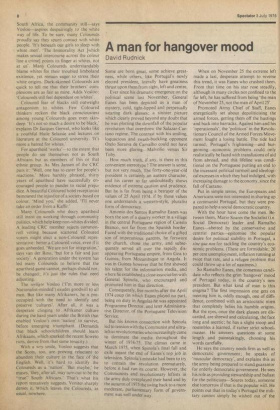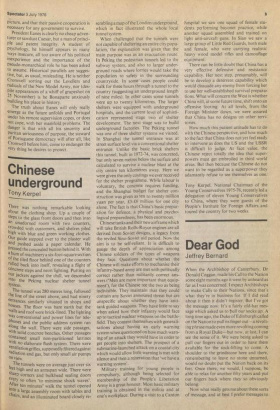A man for hangover mood
David Rudnick
Some are born great, some achieve greatness, while others, like Portugal's newly elected president, literally have greatness thrust upon them from right, left and centre.
Ever since his dramatic emergence on the political scene last November, General Eanes has been depicted as a man of mystery, cold, tight-lipped and perpetually wearing dark glasses; a sinister picture which clearly proved beyond any doubt that he was plotting the downfall of the popular revolution that overthrew the Salazar-Caetano regime. The contrast with his smiling, loquacious and swash-buckling opponent Otelo Saraiva de Carvalho could not have been more glaring—Malvolio versus Sir Toby.
How much truth, if any, is there in this convenient stereotype ? The answer is some, but not very much. The forty-one-year-old president is certainly an austere character, and his career so far undoubtedly shows evidence of extreme caution and prudence. But he is far from being a betrayer of the values of 25 April 1974, if by those values one understands a western-style, pluralist form of democracy.
Antonio dos Santos Ramalho Eanes was born the son of a quarry worker in a village in the central Portuguese region of Castelo Branco, not far from the Spanish border. Faced with the traditional choice of a gifted son of impecunious parents, he forswore the church, chose the army, and subsequently served all over the rapidly disappearing Portuguese empire, from Goa to Guinea, from Mozambique to Angola. It was in Guinea however that he first showed his talent for the information media, and where he established a close association with General Spinola, who encouraged and promoted him in that direction.
Consequently, five months after the April 1974 coup (in which Eanes played no part, being on duty in Angola) he was appointed Programme Director, and later Administrative Director, of the Portuguese Television Service.
But his known connection with Spinola led to tension with the Communist and ultraleftist revolutionaries who increasingly came to dominate the media throughout the winter of 1974-75. The climax came in March 1975, when Spinola's final fall and exile meant the end of Eanes's top job in television. Spinola's mistake had been to try to contain the revolution prematurely, before it had run its course. However, the Communists and revolutionary leftists in the army duly overplayed their hand and by the autumn of 1975 the swing back to a more moderate,. parliamentary form of government was well under way. When on November 25 the extreme left made a last, desperate attempt to reverse this trend, it was Eanes who crushed them. From that time on his star rose steadily, although in many circles not confined to the far left, he has suffered from being 'the man of November 25, not the man of April 25'.
Promoted Army Chief of Staff, Eanes energetically set about depoliticising the armed forces, getting them off the hustings kind back into barracks. Against him and his 'operationals', the 'politicos' in the Revolutionary Council of the Armed Forces Movement fought a losing battle. The tide had turned; Portugal's frightening—and burgeoning—economic problems could only realistically be faced with transfusions of aid from abroad, and this lifeline was conditional on the Portuguese putting an end to the incessant political turmoil and ideological excesses in which they had indulged, with increasing damage to the economy, since the fall of Caetano.
Put in simple terms, the Europeans and Americans were not interested in shoring up a communist Portugal, but they were prepared to help a social democratic country.
With the hour have come the men. Between them, Mario Soares the Socialist (i.e. Social Democrat) leader and Ramalho Eanes—abetted by the conservative and centrist parties—epitomise the popular desire for political stability in Portugal, a sine quo non for tackling the country's economic problems. (These are formidable; 20 per cent unemployment, inflation running at twice that rate, and a refugee problem that could throw up a lot of nastiness.) So Ramalho Eanes, the consensus candidate who reflects the grim 'hangover' mood of Portugal today, is the country's new president. But what kind of man is this enigma ? The first impression one gets on meeting him is, oddly enough, one of diffiClence, combined with an aristocratic mien that completely belies his humble origins. But the eyes, once the dark glasses are discarded, are shrewd and calculating, the face long and ascetic; he has a slight stoop and resembles a learned, if rather strict schoolmaster. He answers questions at some length and painstakingly, choosing his words carefully.
He says the country needs firm as well as democratic government ; he speaks of 'muscular democracy', and explains this as the army being prepared to stand guarantor for orderly democratic government. He sees his role as providing stewardship and ballast for the politicians—Soares today, someone else tomorrow if that is the popular will. He points out that in today's Portugal the military cannot simply be wished out of the Picture, and that their passive cooperation is necessary for any government to survive. President Eanes is clearly no cheap adventurer or sawdust Caesar, but a man of principle and patent integrity. A student of Psychology, he himself appears in many ways insecure, all too aware of his political inexperience and the importance of the pseudo-monarchical role he has been asked to assume. Historical parallels are suggestive, but, as usual, misleading. He is neither Cromwell sorting out the Levellers and radicals of the New Model Army, nor (despite appearances of a whiff of grapeshot on 25 November) is he Bonaparte anxiously building his place in history. The truth about Eanes will only really emerge as the future unfolds and Portugal under his remote supervision copes, or does not cope, with her manifold problems. The danger is that with all his sincerity and Puritan seriousness of purpose, the steward of Portuguese democracy will after all, like Cromwell before him, come to endanger the very thing he desires to protect.



































 Previous page
Previous page